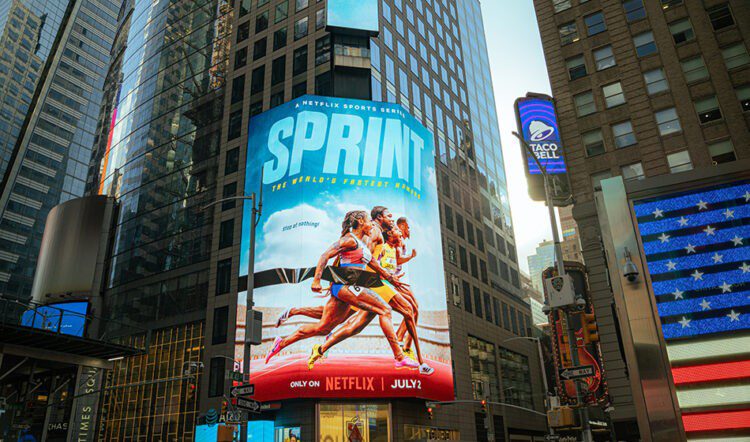The person in seat 461 – excessive up on the east aspect of what a few of us will all the time know because the Olympic Stadium – leant over to his a lot youthful neighbour to ask a query. “Are you able to hear what the announcer is saying, or is it simply me?”
“No, not likely,” the youthful spectator, nearly actually geared up with higher listening to, replied.
I used to be that man in seat 461 on the London Athletics Meet in July, having to make the perfect of neither with the ability to correctly see the end line nor hear the phrases on the PA system. I had chosen cheaper tickets, so I knew I might not be within the entrance row within the house straight, however I assumed (wrongly, because it turned out) that the big screens would assist me bridge the hole.
My improvised resolution was to observe the reside motion as finest I may, after which see (and listen to) it through the BBC broadcast a couple of seconds afterward my iPad. Not ideally suited. It prompted me to surprise why one thing just like the in-venue radio channels you’ll discover at occasions reminiscent of Wimbledon and golf’s Open Championship wasn’t out there.
This should have been roughly the fiftieth monitor and subject assembly I’ve attended, however it was my first as a paying spectator. Virtually 4 a long time earlier, I had been a producer for BBC Radio, organising its athletics protection and conducting interviews with the likes of Seb Coe, Frank Dick, Carl Lewis and Fatima Whitbread at conferences from Antrim to Zurich throughout the sport’s heyday.
John Evans and BBC commentary colleagues
Engaged on London’s bid to host the Olympics after which London 2012 itself sparked renewed curiosity, however in actuality athletics to me had develop into one thing simply to tune into throughout the Olympics, and possibly the World Championships.
Now my curiosity was rising once more, fuelled by the success of athletes like Keely Hodgkinson, Matt Hudson-Smith and Josh Kerr, and engrossing documentaries on the BBC in regards to the stars we knew merely as Linford and Daley. I used to be again caring about athletics and studying AW for the primary time because the days of Mel Watman.
Now I’m left questioning if the success of these years within the Nineteen Eighties can ever be replicated, and the way.
Coe has referred to that period as being the game’s zenith, one which his extraordinary rivalry with Steve Ovett helped construct. Add in larger-than-life personalities reminiscent of Daley Thompson, the truth that Britain may name on a powerful regional unfold of expertise, and the sporting drama being proven on prime-time TV, when there have been solely three or 4 channels, and the recipe for achievement was clear. This was earlier than the plethora of TV platforms, crimson buttons, numerous smaller channels, in addition to web sites and apps, took a number of the sporting drama from centre stage.

Steve Cram beats Steve Ovett (Mark Shearman)
Again within the day, there was what Coe noticed as being “the shit product” served up by soccer at a time when “all our massive, nationwide sports activities had been under-performing”. That will have been unfair on the English golf equipment that received the European Cup six years in a row into the 80s, however the sentiment has some crude accuracy. His sport, Coe advised the Thompson documentary, introduced one thing “healthful” to newspaper readers. (This was in fact earlier than Ben Johnson, doping in Russia and all that.)
Athletics was fortunate to have massive names aplenty, massive personalities, massive success and typically massive controversy to maintain it within the headlines however now issues are a lot more durable, though the game’s attain is definitely rising.
Within the three Olympic Video games of the Nineteen Eighties, 21 nations received monitor and subject gold medals. Within the final three – Rio, Tokyo and Paris – that quantity has swelled to 41. This very completely different world brings with it rather more numerous and globally unfold sporting expertise, with some sports activities and far of the printed panorama dramatically completely different from 40 years in the past.
Except for behemoths like soccer, each sport has to struggle for its slice of consideration so is there a simple method of bringing folks like me again to athletics and, extra importantly, lure newcomers?
To try this, these new spectators have to be made extra welcome than I felt they had been in July. A devoted radio or on-line channel that does rather more explaining in regards to the folks, the motion, the ways, even the know-how getting used, would make such a distinction.
Why was there not a meet-and-greet occasion afterwards to attach the celebrities with first-time spectators? Why not embrace one thing pitched at new spectators within the occasion programme, and even as a separate publication? These can’t be one-off initiatives, although – they want repeating at each massive assembly.
It will be nice to assume {that a} competitors like Michael Johnson’s Grand Slam Monitor or a TV collection like SPRINT may make all of the distinction, however I’ve to echo Cathal Dennehy in his doubts in regards to the doubtless impression of the admittedly very slick Netflix documentary. Seemingly it has been a rankings success however, as he wrote in July’s AW: ”If we predict it’ll magically create droves of latest, loyal followers, we’re in for a letdown.”

The elixir, the options the game has been ready for, Dennehy wrote, “lie removed from a Netflix collection”. Sure, rivalries are key and there are some encouraging indicators right here, particularly within the middle-distance occasions. Given the success tales of the previous yr, it does really feel like there may be at the moment an enormous alternative to know.
Additional funding and labour being directed in the direction of expertise ID and growth, making certain there may be one other era of stars to comply with within the footsteps of the present British crop, could be on the prime of the want listing. However doing that, in fact, wants cash and the assistance of at present’s massive names to draw sponsors. Expertise and success, mixed with media coaching and imaginative advertising and marketing to make athletes partaking and newsworthy, might in time elevate the game’s profile and assist carry extra folks by the door.
Crucially, although, the in-stadia expertise must be memorable for the suitable causes when the general public turns up. Absolutely that will be place to start out.
» Subscribe to AW journal right here, take a look at our new podcast right here or signal as much as our digital archive of again points from 1945 to the current day right here




















